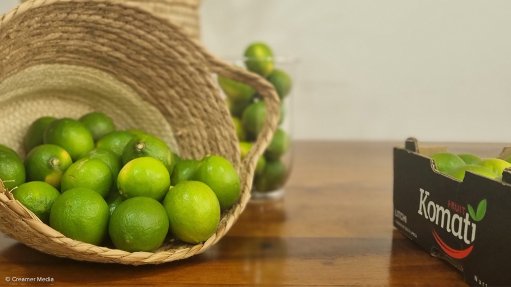
Limes produced by the Moletele community and Komati Fruit
Photo by: Creamer Media's Marleny Arnoldi
Since beverage manufacturing group South African Breweries (SAB) invested R19-million in 2020 to develop a lime supply source near Hoedspruit, in Limpopo, the farm has grown to 60 ha of orchards that have produced 1.1-million limes.
SAB’s premium beer brand, Corona, is best enjoyed with a slice of lime; however, a lack of local lime supply was affecting the beer’s authentic drinking ritual, the brewer points out.
The group took the opportunity to address the shortage in a meaningful way that delivered value to people, the business and the environment by investing in a new farm.
The farm is jointly owned by the Moletele Communal Property Association, with a 51% stake, and established fruit producer Komati Fruit Group, which is well-versed in the workings of agriculture in the region and across the country.
Of the more than 90 000 ha of citrus orchards in South Africa, less than 10% of the land was dedicated to limes. The joint venture farm, called Richard Kopano, has grown to be the single-largest lime-producing farm in the country, with 34 092 trees.
Most of the limes are sold back to SAB, with the balance being sold in the domestic market. The partners plan to export excess production in future.
SAB corporate brand director Marsha Kumire says the empowered community farm aligns well with Corona’s ethos of sustainability and being close to nature.
Agriculture, Land Reform and Rural Development Minister Thoko Didiza, who also visited the farm alongside media on January 24, agrees, saying that beer brewing is an agriculture-intensive practice and contributes to the country’s environmental and social objectives.
SAB corporate affairs VP Zoleka Lisa adds that, in SAB’s commitment to invest in local industries that are connected to its supply chain, the group is anchored in the farming fraternity, especially emerging farmers.
With the Moletele community providing land and labour towards the operation, and Komati the necessary training, upskilling and farm management, it has benefited the area through job creation, localisation and introducing more affordable limes in the market.
“The partnership has elevated the production of limes in South Africa, ensuring an all-year supply of the crop. Equally important is the positive change that this intervention has brought to the community of Moletele, from dividends that go to the beneficiary families to job creation, skills development and skills transference,” Lisa explains.
Didiza says the joint project exemplifies the power of collaboration between private entities, communities and government, showcasing what can be achieved when parties are united for a common coal. She believes the collaboration sets a positive precedent for future community private partnerships in agriculture and sustainable economic development.
INNER WORKINGS
Komati CEO Piet Smit tells Engineering News that the community private partnership to produce Moletele Corona Limes, as the fruit is called, has set a benchmark for lime farming in South Africa.
He elaborates that the orchards undergo measured irrigation and fertilisation to ensure a controlled environment for year-round production, as opposed to the four months of production that is typical for most citrus operations.
The farm uses an innovative split-block technique where six production blocks mimic different seasons to keep the trees flowering at different times and for much longer.
Smit expects the farm will be able to harvest between 60 t/ha and 70 t/ha from the lime trees in future, once they reach maturity at six years. This translates to about 13 000 t/y of lime production.
The farm has ample surrounding land for further expansion, Smit confirms, should demand continue to grow.
All the proceeds from the sale of the limes go back to the 1 615 families that make up the Moletele community. The farm currently employs 14 people, which, coupled with seasonal jobs, supports up to 55 households.
SAB has been investing in agriculture in South Africa for many decades with a strong footprint in barley production.
In 2020, South Africa produced only 60% of SAB’s barley requirements and owing to several successful partnerships in agriculture, the country’s produce has grown to an excess of 20% of the requirement.
As a result of these partnerships, many emerging farmers have grown to become commercial farmers, Lisa says, adding that SAB continues to focus on leaving a positive legacy with its operations.